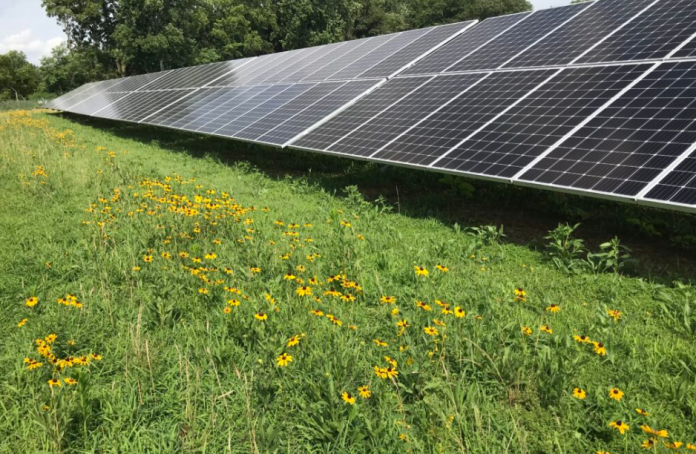A state agency may make it easier to stop and smell the flowers by encouraging the planting of more native pollinator species around solar developments.
This month, the Virginia Department of Conservation and Recreation awarded the state’s second Pollinator-Smart certification, a designation given to solar developers that plant native pollinator species alongside solar projects.
It’s been a slow start for Pollinator Smart, a voluntary state program that’s been in operation for three years. Some solar developers say they support the idea behind Pollinator Smart but in practice face challenges carrying out its requirements, such as ensuring plants don’t block the panels. Still, some localities require the certification.
“I think the fact that it’s not mandated is why it’s taking some time to get traction,” said Rene’ Hypes, a project coordinator with DCR. “But I think as awareness is increasing, I think that is increasing the consideration for doing this.”
The certification process could be altered to achieve more success, said Bryan McKnight, a landscape planner with Timmons Group, an engineering and design firm used by many solar developers and local governments, but “I think having this as a required practice makes sense.”
As solar development has boomed across Virginia, a majority of localities have begun to encourage developers to plant pollinators alongside their panels, but Louisa County and Patrick County are among the four that mandate that projects get the Pollinator-Smart certification because of the agricultural and ecological benefits it provides.
“Anything we can do to promote pollinators is important for an agricultural community,” said Tom Egeland, senior planner with Louisa County. “The purpose for putting it in the code was to support agricultural pollinators.”
The pollinator program
The Pollinator-Smart certification began as a way to conserve biodiversity as solar development increased. It began in Virginia in 2019, based on other programs around the country.
Certification is awarded to developers who achieve a high enough score on a state rubric that examines whether they have implemented practices to promote pollinators such as planting certain native species under solar panels, in wide-open areas and as fenceline buffers.
“The committee tries to work with the applicant to make this work for their project,” Hypes said. “It’s really a back and forth.”
The department points to a host of ecological benefits associated with the establishment of pollinators in solar fields. Besides providing diverse plant species, pollinators tend to have deep root systems that can help with stormwater management and can foster micro-climates that provide a cooling effect for increased solar production. Comparatively, a solar field that has grass under it may require more maintenance like mowing.
“We’re talking about a huge opportunity,” Hypes said. “Aesthetically also. Think about a solar site that has flowers blooming from spring through fall compared to a site that has turf grass, and gravel and dirt areas for roads and access.”
The Pollinator-Smart certification is designed for utility-scale solar facilities, those that generate 5 or more megawatts of electricity. In Virginia, each megawatt of solar capacity on average requires just under 10 acres.






